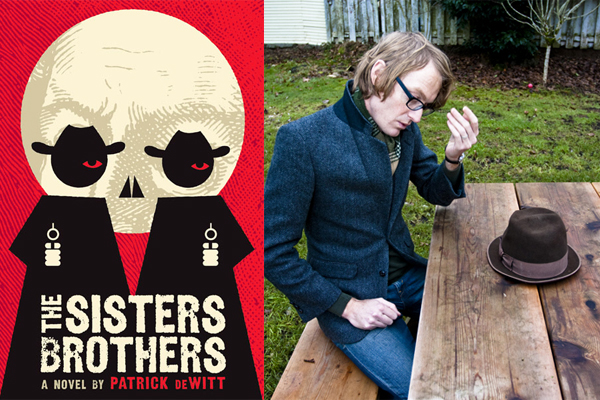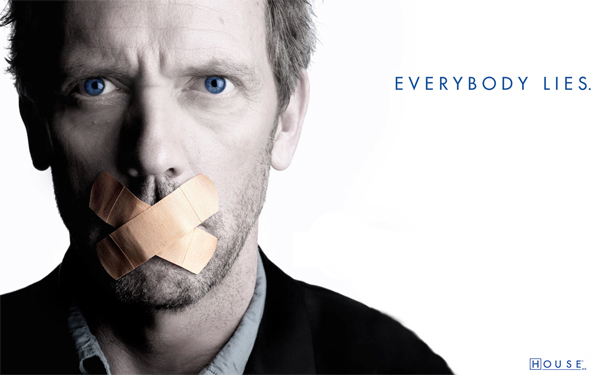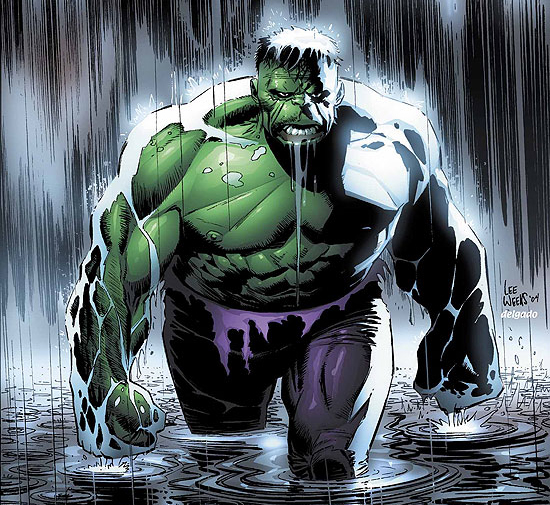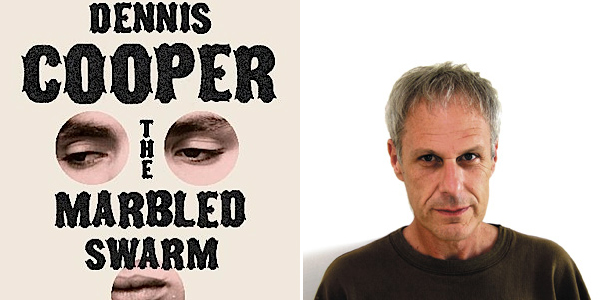It was our blood and guts: an interview with Patrick deWitt
Last year, many of us read Patrick deWitt’s excellent Western The Sisters Brothers. The novel (which I reviewed here) concerns two brothers, Eli and Charlie, who hurt and kill men for a living. A great work in a little-appreciated genre, the book went on to win a Governor’s General Literary Award and a Rogers Writers’ Trust Fiction Prize, and was short-listed for the Man Booker Prize. It is newly released in paperback (though I’ll admit I like the hardback’s cover better, and for my part, I read it on the Kindle). He is also, though the interview doesn’t touch on this, the screenwriter behind the recent film Terri. Mr. deWitt was kind enough to spend a little time with some questions I sent him. I don’t know if I touched his soul or anything, but his answers were good, and his book is very much worth your time.
In an interview for the Man Booker Prize, you said: “It would be harder for me to write those same scenes without the twist. In real life, violence is graceless, pathetic, weird, or simply funny. But it’s almost never righteous or noble, and I tried to avoid writing about it that way.” I think a lot about violence, but I’ve never really experienced it myself. The idea that it’s not noble or righteous isn’t too surprising, but “pathetic” and “weird” are two adjectives I’ve encountered less often, I think, and I like them. Reading this made me curious about your experience with violence, and what leads you to see it in the way that you do.
I was never a violent person. It was never something I had any stomach or aptitude or reverence for. I went to a lot of punk etc. shows starting at the age of 12. This was in the San Fernando Valley in the late 80s, and anyone going to these shows certainly saw a lot of violence, though it wasn’t mandatory to take part, and I found it easy enough to skirt. Later on my friends and I got into drinking and drugs, and this was a blood-and-guts period of time, but it was our blood-and-guts. It was ugly but we weren’t, you know, marauders. Later still, working at a bar, fights were common, and these usually matched the description above (pathetic, weird). This was probably where I adopted that attitude toward violence, actually. We’d just stand there and watch. I remember these two meaty white guys with shaved heads going at it on the floor. They’d ripped each other’s shirts off, and a customer looked at me and said, “It’s like babies fucking.” Physical confrontation is just an awkward social interaction taken to the extreme, it seems to me. READ MORE >
I have become dead to your book recommendations.
Roxane recently mentioned one of those weird, unspoken things about writers: we are constantly pretending to buy and read each other’s books. Publish something yourself and you’ll quickly see what I mean. You get an e-mail every time someone makes an order. The e-mail tells you the buyer’s name and even where he or she lives. So when someone says on Facebook, “I can’t wait to get this book!” and they tag you in the post so you’ll definitely see it, you get really excited about the order and you look forward to mailing them the book that you’re sure they’ll enjoy, and you wait and you wait for that e-mail with the person’s name and address, but the order never comes, and because you want to stay friendly with the person you tell yourself that it wasn’t a lie, that they probably just forgot. And sometimes they really did forget.
Sometimes they say, “I just ordered this book, you should too!” and you can plainly see that they haven’t ordered the book, and this is harder to forgive, but really, who cares? Why should anybody care?
Disrupting the learning of writing
I am going to write some numbered paragraphs and then I am going to ask for your input. The numbers are there to create the illusion of motion and clarity of purpose. I am thinking out loud.
1. I was homeschooled. There are many ways to do this. I lived in Indiana, where you don’t even have to register your children with the state as being homeschooled (so that the school system first discovered I existed when I signed up for the draft). Some parents hire tutors for their children. Other parents send them to school for some courses (usually the technical ones they aren’t qualified to teach, and those with lab components) and keep them home for others. Some of them use this opportunity to control all cultural consumption by the child so that the child will have no choice to be religious and clean-mouthed and good, as well as probably emotionally crippled and totally incapable of making friends or otherwise enjoying life.
2. For my part, I was allowed to study pretty much whatever I wanted in pretty much whatever way I wanted, meaning that my math is poor but I did spend quite a lot of time reading and writing. I am used to teaching myself by following the examples of the things and people I respect and admire. (As to the questions of my emotional health and facility with personal interactions, well, I’ll let you be the judge.) READ MORE >
How to be unemployed
About 1.5 months ago you realized that you had to quit your job. You had been excited about the job — it seemed like a good fit, and for the first time in your life you were making enough money that you didn’t have to worry. But it wasn’t a good fit, for a lot of reasons that we won’t go into now. (It seemed designed to stress you out. It was the first job you’ve ever not enjoyed.) For the purposes of this post, “you” are me. So here is what you do.
1. Look for work. Constantly. Write and rewrite your cover letters. Despair on days where no suitable openings appear on the job sites. You are limited to one small city because that’s where your wife works and your wife has a good job, so you’re not going anywhere for probably a long time. Your next job is somewhere in this city.
2. Write that novel. The one about super heroes. Double its considerable length in your first month of unemployment. You don’t write that much more on a day-by-day basis when you’re out of work (you average 1,000-1,200 words, rather than 700-1,000) but it adds up fast. Think about what you will write when the novel is over. It will have to be short stories. This is novel #7, it’s time to get published (this one, and/or #6) or admit that it’s not going to happen.
3. But it has to happen. READ MORE >
First Word
I have a longstanding interest in comics. There was a long period where I wanted more than anything to make a great online experimental comic. I still want to make comics, actually, but as an artist I am debilitatingly neurotic. I delete everything I draw on the computer, trash everything I draw on paper. I spend a lot of time wishing that I knew an artist who would like to work with me and make a lot of money. (I am overconfident in this regard, perhaps.)
Patrick Farley was one of many inspirations. His work has regularly bumped up against the limits of current technology. The results were sometimes awkward and even garish, but they were also sometimes incredible, and they always felt like a glimpse into the future of the form. His new comic First Word is perhaps the first time I’ve read something by Farley and felt that it was doing exactly what it meant to do. The technology, and Farley’s ability to manipulate it, has caught up, and there are several truly breathtaking sequences. I guess I should mention that it’s NSFW, unless you work somewhere awesome.
I’ll admit I’m not always entirely clear on what’s going on — the comic is wordless — but there comes a point where that really stops mattering. Curious what you all think of this.
A guide for those who would be typeset
Today at Slate, Farhad Manjoo does editors and designers everywhere the service of insisting on the plain and simple truth: putting two spaces after a period (or a colon, or a question mark, or an exclamation point, or etc.) is not just unnecessary, it is wrong, and furthermore a pain in the ass for everyone who has to handle your work when you’re done with it. It wasn’t long ago that it didn’t really matter how many spaces you used in a manuscript. The typesetter would have to retype the entire thing character by character, and it was very easy for them to remember not to key two spaces simply because the manuscript contained them. However, things have changed. We no longer re-type anything. We insert documents into other documents. We copy and paste. While it has become increasingly common for writers to work with an awareness of what typesetters do (because they are more and more often themselves doing this work, though perhaps more often in a WordPress “Add New” page or a Dreamweaver window than InDesign or Quark Xpress), I am still frequently amazed and disheartened by the ways in which they choose to format their manuscripts. Let’s talk about these things a little.
First, we need to define the problem more clearly. Basically, our goal should be to create the cleanest, most format-neutral manuscripts possible, with clear indications of the work’s intended appearance. What you create is not what will be published, but a source document. The goal is therefore not to simulate a published page, but to make a useable document that serves that purpose. There are four areas where writers most frequently get things wrong: the aforementioned spaces between sentences, indenting paragraphs, paragraphing generally, and page breaks. READ MORE >
Cover Fail
The difference between a press you’ve admired for years and a press you’ve never heard of is the former is willing to pay a little money for its covers. There are presses that have been around for decades, that pour their sweat and tears into publishing more words than any of us realize, and that absolutely no one but a tenure committee cares about because they can’t be bothered to pay for a decent cover. I’m not above designing without the proper training myself, but I at least pay for raw art to use on my magazine’s covers — and I do try to actually design. I didn’t want to call anybody in particular out, and it’s insanely easy to replicate the bad covers that drive me up the wall, so I made a few shit covers of my own. If your press’s output looks anything like this, for the love of God, stop what you’re doing and find a freelancer to do something better.
Now let’s talk about what happened here:
The Hero’s Body
This post is an essay about comic books and sex. These are things I am thinking about because of a book I am writing.
In May of 1962, the brilliant scientist Bruce Banner rushed into the site of an experimental gamma bomb detonation in order to save a teenager, young Rick Jones, from the blast. Banner stood at the blast’s center. His body absorbed a massive dose of gamma radiation. Banner soon found that when he lost control of his temper, he would become the Hulk, a super-strong, bulky monster with green skin and the collective smarts of a box of rocks. The Hulk was originally more of a monster than a hero, back when monster books still sold; Stan Lee created him by combining him with Frankenstein’s creature and the Hyde of Jekyll and Hyde. He also compared him to the golem. The Hulk looks like this:
My fear arouses me: an interview with Dennis Cooper
The odds are decent that you know Dennis Cooper better than I do. After hearing about his work for years and constantly promising myself that I would try a little someday, I found myself graduated from the MFA program with time to read books of my own choosing again, and so I finally started reading his novels, and I haven’t stopped in the few months since. You’ve already read in this space about his latest book, The Marbled Swarm, a ludicrously powerful book that you really need. After reading The Marbled Swarm I had to send him some painfully earnest fan mail, and he received this note with a grace and generosity that will surprise no one who has read his blog. I asked if I could interview him. He said yes. His answers are more than worth your time; the book demands it.
So I had a really frustrating experience buying The Marbled Swarm at a local independent bookstore. I saw that they had two copies of Blake Butler’s There Is No Year shelved where you would expect, and I figured it would be easy from there because a) you share a press and b) “Butler” is alphabetically pretty close to “Cooper.” After a long search, I had to go ask one of the bookstore employees. She said that your book was supposed to be shelved in gay fiction, with a question mark at the end of her statement. (I was there with my wife; the employee seemed skeptical that I would want a book from the gay fiction section. I was sort of furious about that whole interaction.) And it was there! Do you like being shelved under the category of gay fiction? Do you think it’s been helpful for your work, commercially or otherwise?
I’m always surprised and disappointed when my books are cordoned off like that. I can’t speak to the reasons why that store in particular shelved The Marbled Swarm there, obviously, but, in general, I think it’s the result of a longstanding habit.
When I published my first couple of novels in the late 80s and early 90s, there was this vogue among critics and publishers regarding the notion of ‘gay literature’. I think that was the point where literary arbiters first cottoned onto the idea that there was a historical trajectory involving the work of authors who happened to be gay that had been largely unexplored and was ripe for a thinkfest. Also, there was apparently a decent sized gay male readership of fiction at that time. I remember people in the publishing industry saying that any gay-themed novel was pretty much guaranteed to sell around 5000 copies, so quite a number of writers who happened to be gay were being swept up by major publishers and given small advances based on the logic that the books would at least earn back if not even make everyone involved a bit of money. I’m not sure if that was actually true or not. READ MORE >
God is a collective action problem
I read maybe a weird amount about finance and economics. I’m not entirely sure why: it’s not as if I have the means, educational or otherwise, to evaluate the truth of what I’m reading. Felix Salmon is one of my favorite writers in this area. He and others have been talking up this post by Steve Waldman as uniquely informative and thought-provoking. I read it and I felt that this was fair, and then I started thinking (as I will so-painfully-predictably do) about its applications to writing. You should read the whole thing, but I’ve put together a short version (with most of the assertions and very little of the evidence-by-example, the gold standard of persuasion!).
I’ll summarize in advance: finance in general, and banks in particular, are hopelessly complex and opaque, but this is basically a good thing. It allows us to trick ourselves into investing despite our naturally risk-averse nature by hiding the risk inherent to investment. Economic development requires us to solve a classic collective action problem: nobody wants to be the first to invest, but we need broad investment and many failed enterprises in order to generate returns–and benefits in terms of human welfare. Banks help us to move past this problem by lying to us (though they themselves believe the fiction). They can’t eliminate risk, but they can and do hide it. This opacity allows them to commit fraud and other shady activities, but it’s probably necessary to develop something like modern civilization. My edited-down version of Waldman’s argument, and some attempts to link this to writing and reading, are after the fold: READ MORE >










